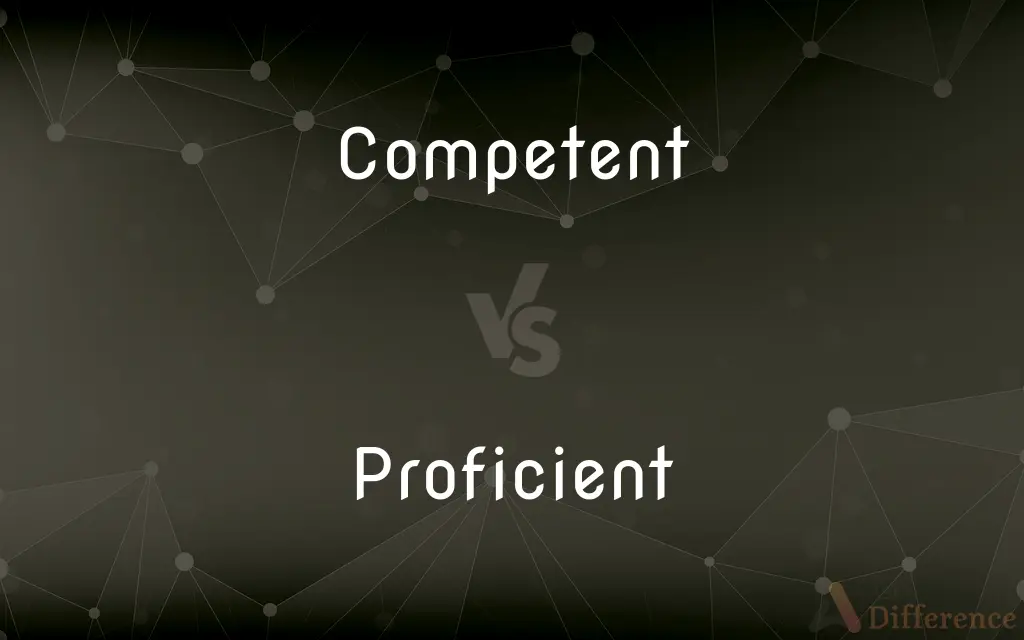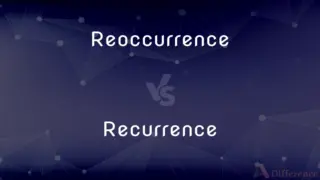Competent vs. Proficient — What's the Difference?
By Tayyaba Rehman — Updated on October 20, 2023
Competent means having adequate ability or knowledge, while Proficient indicates a high level of expertise or skill.

Difference Between Competent and Proficient
Table of Contents
ADVERTISEMENT
Key Differences
Competent and Proficient are two terms that denote skill levels, but they vary in the degree of mastery implied. Competent suggests that an individual possesses the necessary skills or knowledge to perform a task adequately, but not necessarily with exceptional skill. Proficient, on the other hand, goes a step further, suggesting that the individual is highly skilled, often from extensive experience or training.
In the realm of language learning, for instance, a competent speaker can communicate effectively in everyday situations, understanding and making themselves understood. A proficient speaker, however, can handle more complex language structures, understands nuances, and can navigate specialized topics with ease.
When hiring for a role, an employer might be content with a competent candidate who can handle the job's basic responsibilities. Yet, they might seek a proficient individual if they want someone who can handle tasks with a higher degree of expertise, innovation, or complexity.
Consider someone learning to play a musical instrument. A competent musician can play songs, understand musical notations, and stay in tune. In contrast, a proficient musician might be able to improvise, understand intricate compositions, and demonstrate advanced techniques with ease.
Both terms, Competent and Proficient, play a pivotal role in assessing and describing skill levels. While competent sets the bar for adequate performance, proficient raises that bar, indicating a deeper level of expertise and mastery.
ADVERTISEMENT
Comparison Chart
Definition
Having necessary ability or knowledge.
Highly skilled through experience or training.
Degree of Mastery
Adequate skills to perform a task.
High level of expertise or skill.
In Language Learning
Can communicate effectively in everyday situations.
Can handle complex structures and specialized topics.
In Employment
Can handle basic responsibilities of a job.
Can handle tasks with higher expertise or complexity.
In Skill Acquisition
Demonstrates satisfactory performance and understanding.
Demonstrates advanced techniques and deep understanding.
Compare with Definitions
Competent
Competent means having the necessary ability or skills.
Jane is competent in her role as a manager.
Proficient
Proficient denotes mastery through experience or training.
He became proficient in Spanish after living in Spain for five years.
Competent
Competent denotes adequate capability.
He is competent at driving, having just passed his test.
Proficient
Proficient suggests exceeding basic standards.
Not only is he proficient in math, but he also excels in advanced topics.
Competent
Competent suggests meeting a basic standard.
He's competent in math but struggles with science.
Proficient
Proficient implies deep understanding and skill.
Her proficient handling of the software saved the company time.
Competent
Competent conveys a sense of sufficiency.
The chef was competent, but the food wasn't extraordinary.
Proficient
Competent or skilled in doing or using something
I was proficient at my job
She felt reasonably proficient in Italian
Competent
Properly or sufficiently qualified; capable
A competent typist.
Proficient
A person who is proficient
He became a proficient in Latin and Greek
Competent
Adequate for the purpose
A competent performance.
Proficient
Having or marked by an advanced degree of competence, as in an art, vocation, profession, or branch of learning.
Competent
(Law) Legally qualified or fit to perform an act.
Proficient
A person who exhibits such competence; an expert.
Competent
Having sufficient skill, knowledge, ability, or qualifications.
He is a competent skier and an expert snowboarder.
Proficient
Good at something; skilled; fluent; practiced, especially in relation to a task or skill.
He was a proficient writer with an interest in human nature.
Competent
(legal) Having jurisdiction or authority over a particular issue or question.
For any disagreements arising from this contract, the competent court shall be the Springfield Circuit Court.
Judicial authority having competent jurisdiction
Proficient
An expert.
Competent
Adequate for the purpose
Proficient
One who has made considerable advances in any business, art, science, or branch of learning; an expert; an adept; as, proficient in a trade; a proficient in mathematics, music, etc.
Competent
Permeable to foreign DNA.
Proficient
Well advanced in any branch of knowledge or skill; possessed of considerable acquirements; well-skilled; versed; adept,
Competent
(geology) Resistant to deformation or flow.
Proficient
Having or showing knowledge and skill and aptitude;
Adept in handicrafts
An adept juggler
An expert job
A good mechanic
A practiced marksman
A proficient engineer
A lesser-known but no less skillful composer
The effect was achieved by skillful retouching
Competent
Answering to all requirements; adequate; sufficient; suitable; capable; legally qualified; fit.
Proficient
Proficient means showing expertise or advanced skills.
As a proficient pianist, she played the composition flawlessly.
Competent
Rightfully or properly belonging; incident; - followed by to.
That is the privilege of the infinite Author of things, . . . but is not competent to any finite being.
Proficient
Proficient conveys expertise in a particular field.
As a proficient coder, she debugged the system quickly.
Competent
Properly or sufficiently qualified or capable or efficient;
A competent typist
Competent
Adequate for the purpose;
A competent performance
Competent
Competent implies satisfactory performance.
She gave a competent presentation, covering all the main points.
Common Curiosities
Are Competent and Proficient synonyms?
While both denote skill levels, Competent suggests adequacy, whereas Proficient indicates higher expertise.
Can a person be both Competent and Proficient in different aspects of a skill?
Yes, someone might be Competent in one aspect of a skill and Proficient in another.
Which term, Competent or Proficient, suggests a higher degree of expertise?
Proficient suggests a higher degree of expertise compared to Competent.
In which contexts are Competent and Proficient most often used?
Both are used in education, work settings, and skill assessments, with Competent implying basic skill and Proficient indicating advanced capability.
Is it possible for standards of Competence to vary across fields?
Yes, what's deemed Competent in one field might differ from another, just as Proficiency standards can vary.
How do assessments differentiate between Competent and Proficient individuals?
Assessments often use criteria or benchmarks to determine if an individual meets the standards for Competence or Proficiency.
Can a person be Proficient without first being Competent?
Typically, one becomes Competent before advancing to being Proficient as skills deepen.
Can someone remain Competent without advancing to Proficient?
Yes, some individuals maintain a competent level without advancing to proficiency, depending on their goals or needs.
Can a person be deemed Competent but not Proficient in a field?
Yes, someone can be adequately skilled (Competent) without reaching a high level of expertise (Proficient).
How does training relate to becoming Proficient?
Training, especially extended or specialized training, can lead to Proficiency in a skill or subject.
In language tests, what's the difference between a Competent and Proficient speaker?
A Competent speaker can manage everyday communication, while a Proficient speaker can navigate complex topics and structures.
Can standards of Proficiency change over time?
Yes, as fields evolve and new knowledge emerges, standards for Proficiency can change.
Does being Proficient always mean being perfect at a skill?
Not necessarily. Being Proficient means having advanced skills, but perfection is a different standard.
Is being Competent in a skill sufficient for most tasks?
Being Competent means one can adequately handle tasks related to that skill, but complex or specialized tasks might require Proficiency.
Are there levels above Proficient in skill assessment?
Yes, in many systems, levels like "Expert" or "Master" might be above Proficient.
Share Your Discovery

Previous Comparison
Reoccurrence vs. Recurrence
Next Comparison
Nosey vs. NosyAuthor Spotlight
Written by
Tayyaba RehmanTayyaba Rehman is a distinguished writer, currently serving as a primary contributor to askdifference.com. As a researcher in semantics and etymology, Tayyaba's passion for the complexity of languages and their distinctions has found a perfect home on the platform. Tayyaba delves into the intricacies of language, distinguishing between commonly confused words and phrases, thereby providing clarity for readers worldwide.














































